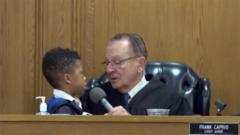The spread of false coup rumors in Ivory Coast reflects rising political tensions and the impact of self-styled pan-Africanist influencers across social media platforms. As the nation prepares for elections, these influencers capitalize on discontent, revealing a complex narrative of local and regional politics.
Disinformation in West Africa: The Rise of Coup Rumors Amid Political Tensions

Disinformation in West Africa: The Rise of Coup Rumors Amid Political Tensions
Recent rumors of a coup in Ivory Coast highlight the growing influence of pan-Africanist influencers and the role of social media in spreading misinformation.
In May, disturbing messages flooded social media as claims of a coup taking place in Ivory Coast surfaced, stirring alarm among locals and those abroad. Dramatic videos allegedly showing soldiers on the streets of Abidjan circulated widely, igniting panic, particularly among Ivorian expatriates. However, these reports were soon debunked as fabrications, marking another instance of disinformation related to military interventions in West Africa—a region already grappling with real coups and political instability.
Experts believe that the rumors originated from a narrative tied to Burkina Faso's military regime and were propagated by a growing number of pan-Africanist influencers. These individuals promote a rejection of Western ties and present alternative leadership models, often glorifying military takeovers as forms of sovereignty-enhancing governance. They especially resonate with younger demographics across various African nations, including Nigeria, Ghana, and South Africa.
As the country approaches its presidential elections, concerns have surfaced regarding the spread of disinformation. Notably, Ivorian President Alassane Ouattarra, attempting to secure a fourth term, is often depicted by critics as a Western puppet—an image that fuels misrepresentation among pan-Africanist circles. While the current government vehemently denies being complicit in the coup rumors, the narratives suggest deeper rifts with neighboring Burkina Faso, where Captain Ibrahim Traoré has gained popularity following his own coup in 2022.
Social media platforms have seen this misinformation proliferate, with notable contributions from various influencers who leverage the dramatic narrative to amass followers. The BBC's Global Disinformation Unit highlighted the timeline of the coup rumors, revealing that Harouna Sawadogo, a pro-government activist from Burkina Faso, first ignited the chatter through provocative posts and rhetoric urging military action in Ivory Coast.
The disinformation campaign not only spreads anxiety but also raises questions about the broader implications for governance and citizen engagement in West Africa. While some influencers appear driven by financial gain, many tap into a genuine discontent over political systems, suggesting an urgent desire for change.
Several analysts warn that while some of these narratives originate in a quest for pan-African solidarity, they may inadvertently sow further discord within the region, putting political and social stability at risk as Ivory Coast gears up for its critical elections.
Thus, the increasing incidence of misinformation surrounding coups in West Africa illustrates a complex blend of political aspirations, regional rivalries, and the overwhelming influence of social media—a potent mix capable of shaping public perception and political outcomes extensively.





















